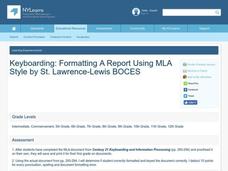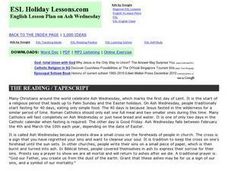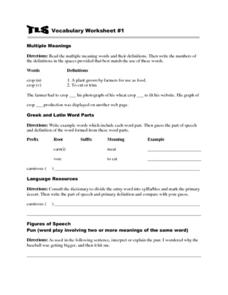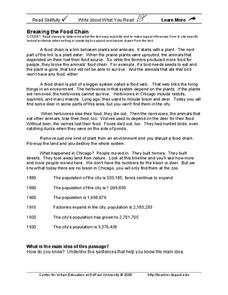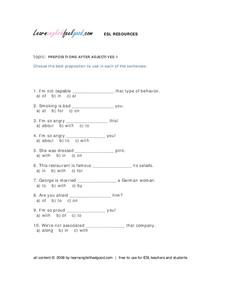Curated OER
Similes with Energy
Fifth graders write or dance a simile to show the relationship between two unlike nouns. In this simile and grammar lesson, 5th graders explore dance movements and identify smooth and sharp energy examples. Students review similes and...
Curated OER
Using Citations in a Research Paper
As a prequel to a research assignment, class members explore writing citations in the modern Language Association (MLA) and American Psychological Association (APA) formats. In pairs, or individually, researchers use books and magazines...
Curated OER
Keyboarding: Formatting A Report Using MLA Style
Introduce your class to the MLA style of formatting. In addition to studying the formatting, learners improve language skills and review word processor features. They use the Interwrite SchoolPad for the first time to assist in proofing...
Curated OER
Fear Factor Fun
Students develop "Fear Factor" stunts using descriptive language. In this writing lesson, students watch clips from the show "Fear Factor" and develop their own stunts. Students write and explain the stunts in vivid language.
Curated OER
ESL/ELD: Learning about Ash Wednesday
An overview of the history and tradition of Ash Wednesday in 2 paragraphs is accompanied by an array of language activities: cloze exercise, phrase matching, word jumble, multiple choice, sequencing, interview, group presentation,...
Curated OER
Metaphors, Similes and Expressions
“Her cutting words were weapons that inflicted wounds upon my soul.” Figurative language is the focus of a worksheet that asks learners to underline the figurative language used in each example, and then to label each phrase as a...
Pennington Publishing
Vocabulary Worksheet #1 & #2
These two worksheets cover several grammatical topics. Pupils work on words with multiple meanings, Greek and Latin word parts, word connotations, academic language, and more. The result is seven quick exercises that could be used...
Grammar Net
For and Since
Fill in the blanks with a worksheet that focuses on for and since. As kids read 20 time-related phrases, they decide whether to use for, since, or no reply.
DePaul University
Breaking the Food Chain
Throughout history, the growth of big cities has resulted in the destruction of ecosystems. In the case of Chicago, IL, a grassland that was once home to bison, deer, wolves, and foxes quickly became a booming city of over three million...
Teacher Printables
Just the Facts
Show your class how fascinating a text can be by asking them to focus on interesting facts they learned while reading. There are boxes for six facts as well as one large box where pupils can record the most important fact from their...
Teach-nology
Author’s Purpose
What is the author's purpose when writing a narrative story? Kids read a short narrative passage before answering three questions about author's purpose.
Teach-nology
Author's Purpose
Challenge your class to find the three purposes for writing. After they read three short passages, kids note whether the author's purpose was to inform, persuade, or entertain.
Novelinks
The Devil’s Arithmetic: Semantic Feature Analysis
Organize the characters in Jane Yolen's The Devil's Arithmetic according to their shared character traits. After listing character traits as a class, kids note which characters exhibit particular characteristics with a discussion and...
LearnEnglishFeelGood.com
Mixed Verb Tenses
He was running or he has been running? Young grammarians must examine context clues to determine which verb phrase to use in ten sentences.
LearnEnglishFeelGood.com
Simple Present or Present Continuous?
Mastering verb tense is an important part of building your learners' reading skills. Young grammarians look over ten sentences and use context clues to decide whether they should use the present or present progressive tense.
LearnEnglishFeelGood.com
Prepositions After Adjectives
Practice reading context clues with a set of ten sentences within a grammar activity. As they examine each sentence, readers choose which preposition would be most appropriate after the adjective shown.
LearnEnglishFeelGood.com
Count or Non-Count Nouns?
Many learners struggle with the difference between count and non-count nouns. When do you use a few or a little? Or much or many? Take a look at ten sentences where young grammarians can use context clues to decide which noun fits in the...
LearnEnglishFeelGood.com
Fewer or Less?
When do you use fewer, and when do you use less? Learn the difference between the two words with a fill-in-the-blank activity that asks readers to make their choice based on the context clues in the ten sentences.
Curated OER
The Treaty Trail: Examining an Artist's Perspective
Elementary school leanrners examine artwork from the time period of the United States and Native American treaties. They discuss the causes and effects of the treaties being signed. They also examine how cultural perspective influences art.
Curated OER
Calligraphy, Handwriting And The Alphabet
Students produce calligraphy projects using writing skills and unique tools in this six-day Art activity. Emphasis is placed upon the work of Portland, Oregon calligraphy artist Inga Dubay and her experiences with "Italic" writing...
Curated OER
Kamishibai Stories
Students explore kamishibai stories, Japanese stories told through illustrated picture cards, and become familiar with their form. Afterward, they develop their own illustrated kamishibai story. Students discuss the process of drawing,...
Curated OER
Quiz 6A: Verb Practice
Here is a worksheet that provides practice using English verb forms like the simple present, simple past, and present progressive. Learners fill in the blanks in 10 sentences using the given verb correctly based on context. I'd go over...
Curated OER
Build Complex Sentences
Learners practice building complex sentences in this sentence combining-like exercise. Two simple sentences are given; your writers must make one reasonable complex sentence out of each pair using the conjunction provided. Ten examples...
Curated OER
Native American Clay Pots
Students explore world culture by conducting an art project in class. In this Native American culture lesson plan, students identify the types of materials American Indians utilized in their artistic endeavors, specifically clay....
Other popular searches
- English Language Arts
- English Language Arts Exam
- English Language Arts Games
- Deaf English Language Arts
- English Language Arts Music
- English Language Arts Heroes
- English Language Arts Skills
- English Language Arts Grade 3
- English/language Arts
- English Language Arts Poetry
- English Language Arts Rating=3
- English Language Arts Unit Sc




